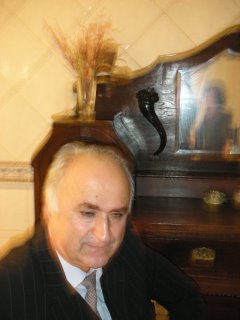
Ambrosi won the prize hands-down for Best-Dressed Man, which automatically puts him in close competition for Coolest Writer. But he is disqualified by the fact that he has already won the prize for Most Mystical Personality.
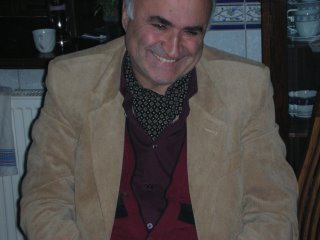
Ambrosi looked good in a three-piece; he had taste in color combination, a woman would not fear to venture into the opera on the arm of this man. In fact, he was always going off the opera or something like that. He looks not only cultivated, he looks like he has a job. Hell, he does have a job. He is an economist, works in the public relations department of the National Bank of Georgia (next door to Russia, not in the Southern US) and is a regular contributor of learned articles on the economy to various Georgian publications. So what is he doing in a literary charity house with a bunch of loser-poets?
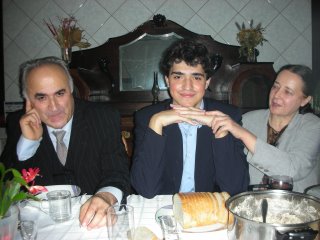
Ambrosi's true love appears to be literature and he indulges his love by translating literature from the Polish into Georgian. Translation is a money-losing proposal in most countries, and it is that even more so in Georgia with its population under 5 million people. But Ambrosi has found a way to do it and finance the venture as well: He translates books (in this case, a book by a great Polish journalist) at his own expense, then he pays for the printing as well, bypassing a publisher altogether.

Then he takes the copies to the Polish ambassador or other Polish institution and hawks his books to them, who buy the books in order to redistribute them to their contacts in Georgia – for them, it is a way of spreading Polish culture. Does he actually make any money this way, or does he simply cover his costs? I have asked him that several times, but I don’t think I got a straight answer. But he is an economist, he must know what he's doing. Maybe all writers should start out as economists.

One day he cooked for us. That is, he imported his ex-wife and son, and she cooked for us, a Georgian dish they called "cold meal." It consisted of cold chicken in a cold sauce of nuts and something else. Whatever else it was, it was fabulous. She gets the Prize for Best Meal Cooked in the Villa Guesthouse.
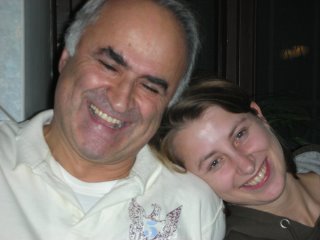
Ambrosi speaks limited English and my Georgian is also limited, and that difficulty of communication did a lot to form his personality as perceived by those of us who did not speak Georgian. Whereas lack of language would make another man seem simple, it lent him an aura of transcendency. With or without language, Ambrosi was forever calm, satisfied and grounded, but he employed his English to make himself seem wise. Though he was often a good sport enough to join us at the table and try to communicate in English, just as often he .limited his language to a knowing "Ye-e-s." There was something about that "Ye-e-s" that radiated calm, even wisdom.
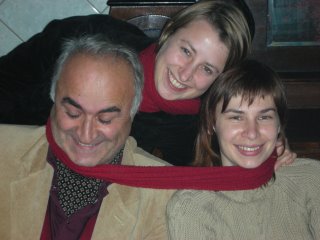
For a long time I thought he was using that "Ye-e-es" in the sense of "Yes," but after a while we learned that there was more to it than that. Andi picked up on it first. We passed Ambrosi as he was leaving the Villa on a bike and asked, "Where are you going?" He answered: "Ye-e-s." Andi asked me, "Did he not understand the question, or did he understand it better than we?" Yes, there is a there. There is only one there. No need to say where it is, it is the only there where worth going to. The question is only whether we are going. And yes, Ambrosi was going there. He was perhaps the only one of us who knew that the there was there.
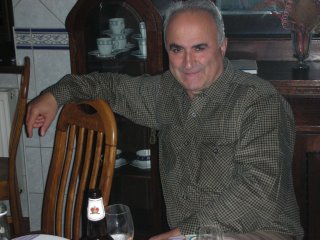
 Ambrosi won the prize hands-down for Best-Dressed Man, which automatically puts him in close competition for Coolest Writer. But he is disqualified by the fact that he has already won the prize for Most Mystical Personality.
Ambrosi won the prize hands-down for Best-Dressed Man, which automatically puts him in close competition for Coolest Writer. But he is disqualified by the fact that he has already won the prize for Most Mystical Personality.  Ambrosi looked good in a three-piece; he had taste in color combination, a woman would not fear to venture into the opera on the arm of this man. In fact, he was always going off the opera or something like that. He looks not only cultivated, he looks like he has a job. Hell, he does have a job. He is an economist, works in the public relations department of the National Bank of Georgia (next door to Russia, not in the Southern US) and is a regular contributor of learned articles on the economy to various Georgian publications. So what is he doing in a literary charity house with a bunch of loser-poets?
Ambrosi looked good in a three-piece; he had taste in color combination, a woman would not fear to venture into the opera on the arm of this man. In fact, he was always going off the opera or something like that. He looks not only cultivated, he looks like he has a job. Hell, he does have a job. He is an economist, works in the public relations department of the National Bank of Georgia (next door to Russia, not in the Southern US) and is a regular contributor of learned articles on the economy to various Georgian publications. So what is he doing in a literary charity house with a bunch of loser-poets?  Ambrosi's true love appears to be literature and he indulges his love by translating literature from the Polish into Georgian. Translation is a money-losing proposal in most countries, and it is that even more so in Georgia with its population under 5 million people. But Ambrosi has found a way to do it and finance the venture as well: He translates books (in this case, a book by a great Polish journalist) at his own expense, then he pays for the printing as well, bypassing a publisher altogether.
Ambrosi's true love appears to be literature and he indulges his love by translating literature from the Polish into Georgian. Translation is a money-losing proposal in most countries, and it is that even more so in Georgia with its population under 5 million people. But Ambrosi has found a way to do it and finance the venture as well: He translates books (in this case, a book by a great Polish journalist) at his own expense, then he pays for the printing as well, bypassing a publisher altogether.  Then he takes the copies to the Polish ambassador or other Polish institution and hawks his books to them, who buy the books in order to redistribute them to their contacts in Georgia – for them, it is a way of spreading Polish culture. Does he actually make any money this way, or does he simply cover his costs? I have asked him that several times, but I don’t think I got a straight answer. But he is an economist, he must know what he's doing. Maybe all writers should start out as economists.
Then he takes the copies to the Polish ambassador or other Polish institution and hawks his books to them, who buy the books in order to redistribute them to their contacts in Georgia – for them, it is a way of spreading Polish culture. Does he actually make any money this way, or does he simply cover his costs? I have asked him that several times, but I don’t think I got a straight answer. But he is an economist, he must know what he's doing. Maybe all writers should start out as economists.  One day he cooked for us. That is, he imported his ex-wife and son, and she cooked for us, a Georgian dish they called "cold meal." It consisted of cold chicken in a cold sauce of nuts and something else. Whatever else it was, it was fabulous. She gets the Prize for Best Meal Cooked in the Villa Guesthouse.
One day he cooked for us. That is, he imported his ex-wife and son, and she cooked for us, a Georgian dish they called "cold meal." It consisted of cold chicken in a cold sauce of nuts and something else. Whatever else it was, it was fabulous. She gets the Prize for Best Meal Cooked in the Villa Guesthouse. Ambrosi speaks limited English and my Georgian is also limited, and that difficulty of communication did a lot to form his personality as perceived by those of us who did not speak Georgian. Whereas lack of language would make another man seem simple, it lent him an aura of transcendency. With or without language, Ambrosi was forever calm, satisfied and grounded, but he employed his English to make himself seem wise. Though he was often a good sport enough to join us at the table and try to communicate in English, just as often he .limited his language to a knowing "Ye-e-s." There was something about that "Ye-e-s" that radiated calm, even wisdom.
Ambrosi speaks limited English and my Georgian is also limited, and that difficulty of communication did a lot to form his personality as perceived by those of us who did not speak Georgian. Whereas lack of language would make another man seem simple, it lent him an aura of transcendency. With or without language, Ambrosi was forever calm, satisfied and grounded, but he employed his English to make himself seem wise. Though he was often a good sport enough to join us at the table and try to communicate in English, just as often he .limited his language to a knowing "Ye-e-s." There was something about that "Ye-e-s" that radiated calm, even wisdom.  For a long time I thought he was using that "Ye-e-es" in the sense of "Yes," but after a while we learned that there was more to it than that. Andi picked up on it first. We passed Ambrosi as he was leaving the Villa on a bike and asked, "Where are you going?" He answered: "Ye-e-s." Andi asked me, "Did he not understand the question, or did he understand it better than we?" Yes, there is a there. There is only one there. No need to say where it is, it is the only there where worth going to. The question is only whether we are going. And yes, Ambrosi was going there. He was perhaps the only one of us who knew that the there was there.
For a long time I thought he was using that "Ye-e-es" in the sense of "Yes," but after a while we learned that there was more to it than that. Andi picked up on it first. We passed Ambrosi as he was leaving the Villa on a bike and asked, "Where are you going?" He answered: "Ye-e-s." Andi asked me, "Did he not understand the question, or did he understand it better than we?" Yes, there is a there. There is only one there. No need to say where it is, it is the only there where worth going to. The question is only whether we are going. And yes, Ambrosi was going there. He was perhaps the only one of us who knew that the there was there.
No comments:
Post a Comment